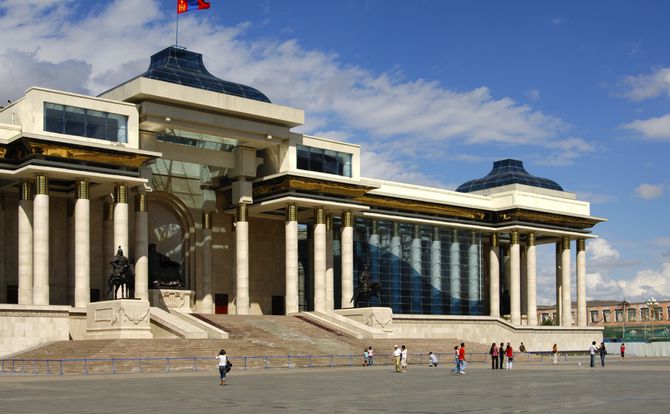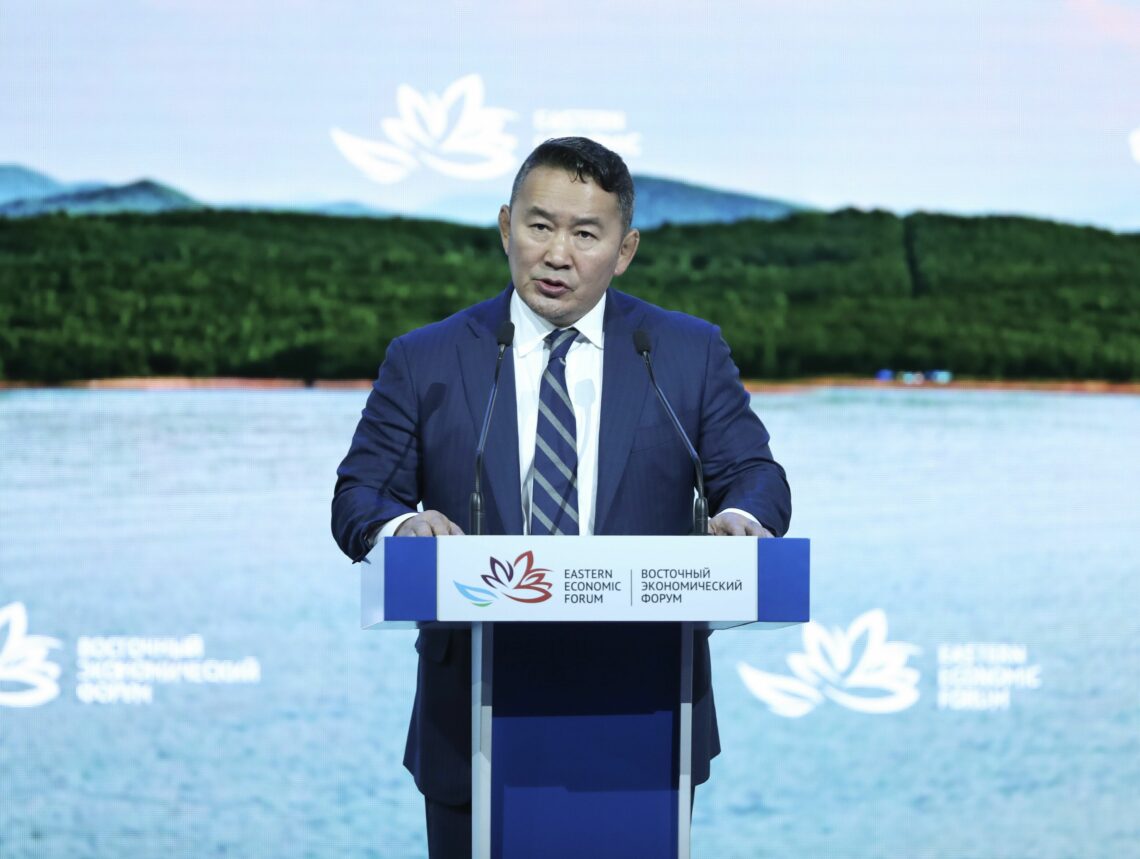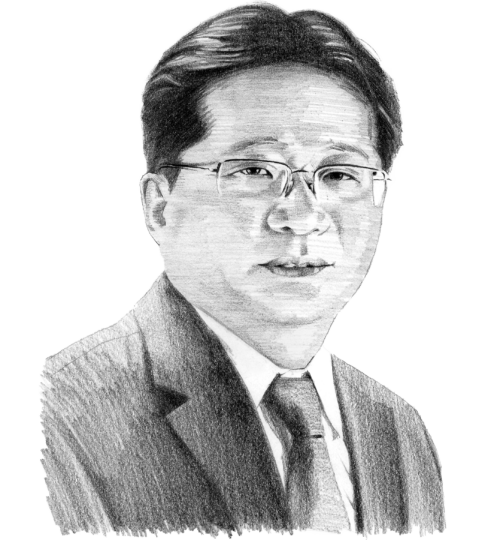Political culture and constitutional reform in Mongolia
Mongolia appears poised to carry constitutional reform. A draft reform has already been submitted by two-thirds of the parliament, and President Khaltmaa Battulga has joined the discussion with proposed amendments of his own.

In a nutshell
- The parliament and the president submitted draft reforms
- The executive branch could gain more influence in parliamentary matters
- The debate over the amendments is likely to end in compromise
Mongolia appears poised to amend its constitution. A draft reform has already been submitted by two-thirds of the parliament, and President Khaltmaa Battulga has joined the discussion with proposed amendments of his own.
Distinct path
Mongolia was one of the first Asian nations to adopt a constitution. In 1924, the Mongolian People’s Republic abolished theocratic monarchy by giving its citizens the right to decide on matters of state through a parliament and a government. Its constitution guaranteed equal rights and free education regardless of gender, religion or race – although it did establish distinctions between social classes. Women gained the right to vote. Hereditary nobility, religious titles and their accompanying privileges were abolished. It was decided that a state treasury encompassing all government incomes and expenditures would be overseen by the parliament. These changes took place under the increasing influence of the Soviet Union, and the constitution also included clauses touching upon socialism and cooperation with exploited nations around the world. Hereditary nobles of high rank, religious dignitaries, traders and owners who earned profit from labor were given the same status as the mentally handicapped, and were therefore barred from entering politics.
Despite the class discrimination, from a historical perspective the 1924 constitution was a considerable step forward. Having only regained its independence from foreign powers, Mongolia immediately transitioned from a theocratic monarchy, which consisted mainly of lords and serfs, to a republic – though one that was dominated by party bureaucracy and defined by class conflict.
Seven decades later, the 1992 constitution marked Mongolia’s departure from one-party totalitarian rule and a centrally planned economy. After thirty years, while almost all of Central Asia experienced some degree of authoritarianism, Mongolia maintained a multiparty democracy with hotly contested elections, as well as a free and dynamic press and civil society. As mentioned in a previous GIS report, this was largely thanks to an even distribution of power among the many branches of government.
Constitutional reform
Mongolia is now about to carry out a constitutional reform with several aims. First, if the amendments are adopted in full, the executive branch will become more powerful. The prime minister will be able to appoint cabinet members without parliamentary approval. The parliament will no longer be allowed to authorize new budget expenditures without government approval – it will only be able to amend clauses proposed by the cabinet. This would be an extraordinary, if not unprecedented, situation for a parliamentary republic.
If amendments are adopted, the executive branch will become more powerful.
More importantly, the amendments proposed by President Battulga seek to increase the number of parliament members from 76 to 108, to introduce a mixed election system similar to those of many European nations. Some of the MPs would be elected from constituencies, while the remaining candidates would be elected through party lists. This mixed system is lauded by many political scientists for its stabilizing effect on governance and policy since it gives greater power to the prime minister, who usually leads the parliamentary majority party, and therefore commands greater authority inside the caucus through the party list.
Presidential powers
If the changes are adopted, presidential powers will remain broad, but not quite as extensive as they have become over the last decade and a half. Presidential veto over any legislation approved by parliament will remain, and so will the two-thirds majority necessary to overturn this veto. In circumstances where the parliamentary opposition and the president belong to the same party, or happen to be aligned on a particular issue, this veto is a potent political weapon that forces the governing party to negotiate with the opposition and the president. The latter is the only political official directly elected by the people, hence the single figure whose democratic authority is akin to that senate, the second chamber of parliament.
The 1992 constitution gave the president the right to nominate the prime minister (although a parliamentary majority can nominate a prime minister without the president’s consent); give instructions to the cabinet (decrees become effective when cosigned by the prime minister); nominate ambassadors with parliamentary approval; and bestow high military and law enforcement ranks. The president also grants pardons and citizenships; heads the national security council (which can declare military mobilization, a state of emergency or war); commands the armed forces; and nominates the public prosecutor general for parliamentary approval.

Since then, presidential powers have expanded far beyond their original mandate. Under President Nambaryn Enkhbayar (2005-2009), the right to nominate the heads of a new independent anti-corruption agency and public service commission was conveniently given to the president – with the parliament appointing the nominees. Similarly, the office of President Tsakhia Elbegdorj (2009-2017) claimed the right to appoint the General Judicial Council (including its chairperson), which nominates judges of all levels for approval by the president. Furthermore, the president also gained the power to consent to the appointment of the head of intelligence services. Hence, the Mongolian presidency gradually amassed the power to nominate, appoint or consent to the nomination of all heads of law enforcement organizations, except the police.
New amendments are likely to redistribute those powers among the president, prime minister and parliament. As a result, while the executive branch will be given more policy latitude through greater influence in parliamentary decision-making, the distribution of powers among branches of government will remain mostly intact.
However, this redistribution of presidential powers is absent from the amendments proposed by President Battulga. On the contrary, he suggests that the National Security Council – chaired by the president and attended by the parliamentary speaker and prime minister – could hold regular reviews of government activities, and make rulings by unanimous decision.
From an institutional perspective, the proposals make sense; the parliament wants to limit presidential powers, and the president wants the opposite. However, it is noteworthy that President Battulga’s suggestions include a clause that would limit the types of laws that can be proposed by various branches of power, including the executive branch. It is highly unusual for the president and the parliament to be considering proposals that would limit their own capacities.
Independent judiciary
Demands for greater judicial independence are likely to be met with genuine effort. In reaction to the perceived political engagement of the judiciary and law enforcement agencies, in 2019 laws were amended to allow the National Security Council (i.e., the president, prime minister and parliamentary speaker) to dismiss – upon unanimous agreement – Public Prosecutors General and their deputies, the High Commissioners of the Anti-Corruption Agency and their deputies, as well as judges of all levels. These changes took place shortly after prosecutors and the judiciary showed an evident lack of willingness to address allegations of torture and inhumane treatment in at least one high-profile case, even after they were corroborated by video evidence presented to the public.
Many saw these changes – more specifically the reliance on political decision-making rather than judicial process for these dismissals – as a sign of political meddling in law enforcement and the judiciary. Others argued that the existing mechanisms had failed to prevent outrageous human rights abuses and that representation would now be extended to the speaker of parliament and the prime minister, which in practice would result in more transparency and parliamentary oversight.
There is something to be said for both arguments. However, the parliament seems to be seeking more legitimate, longer-term mechanisms. Thus, their proposed amendments to the constitution grant the right to nominate the General Judicial Council to a broader number of parties such as representatives of judges of all levels, with the parliament appointing the members. The appointment and dismissal of judges would be decided by an independently established oversight committee within the council and finalized by a presidential decree. If the amendments are adopted, judges will be subject to an independent judicial process in cases of dismissal, while the Public Prosecutor General and the High Commissioner of the Anti-Corruption Agency along with their deputies would be subject to parliamentary supervision, as well as democratic oversight through the National Security Council.
The president’s amendments leave the General Judicial Council process as is – to be appointed and dismissed by the president. However, it proposes more independence for the Disciplinary Committee. If the changes are adopted, they may or may not result in a more independent judiciary and law enforcement, but they will be a step in that direction.
Institutional consensus
All major institutions and political parties seem to agree on the necessity to amend the constitution. The president’s office submitted proposals of its own rather than simply rejecting the reform proposal, explicitly acknowledging the need for a dialogue around the current constitution. The parliamentary opposition, while declaring the majority morally unfit to undertake such a significant reform, does not object to potential amendments. It expressed support for the president’s suggestions, and put forth additional changes. Smaller parties appear to be content with the possibility of introducing proportional elections, which would greatly increase their chances of representation. Some are suggesting a shift to a presidential republic, while others want a more classical parliamentary system. Researchers and public figures are also actively expressing their views.
The parliamentary opposition does not object to potential amendments.
Additionally, the draft reforms take demands for a more stable and professional public apparatus into account. Both the parliament and the president proposed requirements for hiring and promoting based on merit and seniority. This is a significant development likely to produce greater legal protection against political meddling in civil service. A government bureaucracy based on seniority and merit is a key requirement in any successful development case, and Mongolia seems to be warming to the idea.
Democratic compromise
Mongolia’s parliamentary republic continues to demonstrate its resilience. Despite a challenging geographic neighborhood and global trends toward autocracy, Mongolia is establishing and stabilizing democratic institutions. In contrast, every recent constitutional amendment in postcommunist countries (except in Eastern Europe) aimed to expand the powers of a specific political actor rather than improve collective decision-making.
To be sure, backtracking and mistakes occur, and authoritarian tendencies resurfaced in Mongolia too, especially during the last decade. Many foreign and domestic observers have attributed inefficient and slow development in comparison to other countries in the region to the confusing and complex process of decision-making in Mongolia. Some quite rightly see the amendments increasing the government’s equity participation in large scale mining projects as resource nationalism and rejection of private investment. On the other hand, a significant part of Mongolian society considers the amendments legitimate.
It is a positive sign that these events are unfolding under public scrutiny. It is even more encouraging that institutional players such as the presidential office, the parliament, major parties and civil society organizations are all willing to analyze and tackle these issues. At first glance, outsiders might think the shortcomings of Mongolia’s current system are insurmountable. Yet the country is dealing with them, airing them and discussing them through democratic means. It is when such issues linger under the surface that democracy is truly threatened.
Countries in transition could draw a lesson from political patterns in postcommunist countries. It is easy to fall under the spell of efficiency or political charisma and vest every power in a single person. However, having multiple centers of power prevents a return to autocracy. Strong parliaments are generally unpopular during transitions, but they are a necessary component of political freedom. A directly elected president in a parliamentary republic can appear redundant, but it can prevent the legislative and executive branches from intertwining. Yet the presidency as an institution has its own innate inclination toward autocracy, and it should always be offset by a strong parliament and government.
The complex interplay of the various law enforcement agencies, the Public Service Commission and the constitutional court can appear messy and difficult to govern, but with adequate supervision, these institutions also play a key role in keeping democracy alive.
Mongolia is progressing better than many countries with autocratic regimes.
While its system may seem overly intricate and unfavorable to efficiency, in terms of gross domestic product (GDP) per capita, human development, and other criteria, Mongolia is progressing equally well or better than most countries with autocratic regimes – possibly because of this convoluted distribution of powers. Such a structure could prove useless in a more advanced democracy, but Mongolia shows that a slower and more careful approach is a safer bet for both economic development and political freedom during political transitions.
When it comes to governing this manifold apparatus, Mongolia has an appetite for political consensus at times of major changes that is notably absent in many other countries in transition. The current discussion over the constitution proves that even the most intense political and personal fights usually lead to constructive arguments. A working group chaired by the president and prime minister is being established. Both major parties will be represented, despite the fact that the opposition party lost the last elections by a significant margin, giving the Mongolian People’s Party a comfortable constitutional majority to adopt these amendments without the support of the president or the opposition.
There is a possibility that the working group will not be able to agree on a consolidated version of the amendments. The amendments could be entirely rejected or differ significantly from the original proposals. But the exercise will be an excellent opportunity for Mongolia to demonstrate the willingness to compromise that has allowed it to safeguard democracy so far. Whether this ability is inherent to Mongolian culture or results from its specific distribution of political power is another matter. What is certain is that the system of checks and balances is alive and well in Mongolia.








